It looks like you're using an Ad Blocker.
Please white-list or disable AboveTopSecret.com in your ad-blocking tool.
Thank you.
Some features of ATS will be disabled while you continue to use an ad-blocker.
share:
reply to post by MystikMushroom
They work really well though. You can get more payload, and more fuel off the deck of one than you can off a flat deck STOVL hull.
They work really well though. You can get more payload, and more fuel off the deck of one than you can off a flat deck STOVL hull.
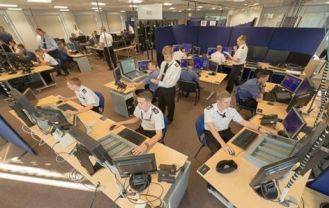
Meanwhile, at the Royal Navy's Maritime Warfare School at HMS Collingwood, the Queen Elisabeth Class’s Combat Management System and Visual Surveillance System are being put through their paces. 37 RN trainees from the Maritime Warfare School are being tested in a variety of challenging & disruptive scenarios set by the Aircraft Carrier Alliance trainers.
And the Artisan 3D radar systems are being tested in a "secret electromagnetic radar testing facility" on the Isle of Wight (a large island off the Southern English coast). Quite how long this secret facility will remain secret is another thing. Someone needs to remind the authors of this article about OpSec !!!!
A new 3D radar capable of cutting through interference equal to 10,000 mobile phone signals, has successfully commenced integration trials at a secret electromagnetic radar testing facility on the Isle of Wight. The testing of ARTISAN 3D radar is in advance of installation on the new Queen Elizabeth Class Aircraft Carriers (QEC) which are being assembled in Rosyth, Scotland. The ARTISAN trials will test a series of integrated systems which include the provision of 3D air surveillance, target identification and air traffic management services for the ships. The ARTISAN 3D Radar will provide extensive air traffic control and medium range tactical picture capability with ground breaking features such as tracking more than 900 targets at one time and has the ability to spot objects as small as a tennis ball travelling up to three times the speed of sound. The BAE Systems radar testing facility on the island occupies the site of the old Somerton Aerodrome which began as an airfield in 1916.
Air Traffic Management
A couple of nice monochrome photographs of HMS Queen Elizabeth from this week.
Quite classy images.
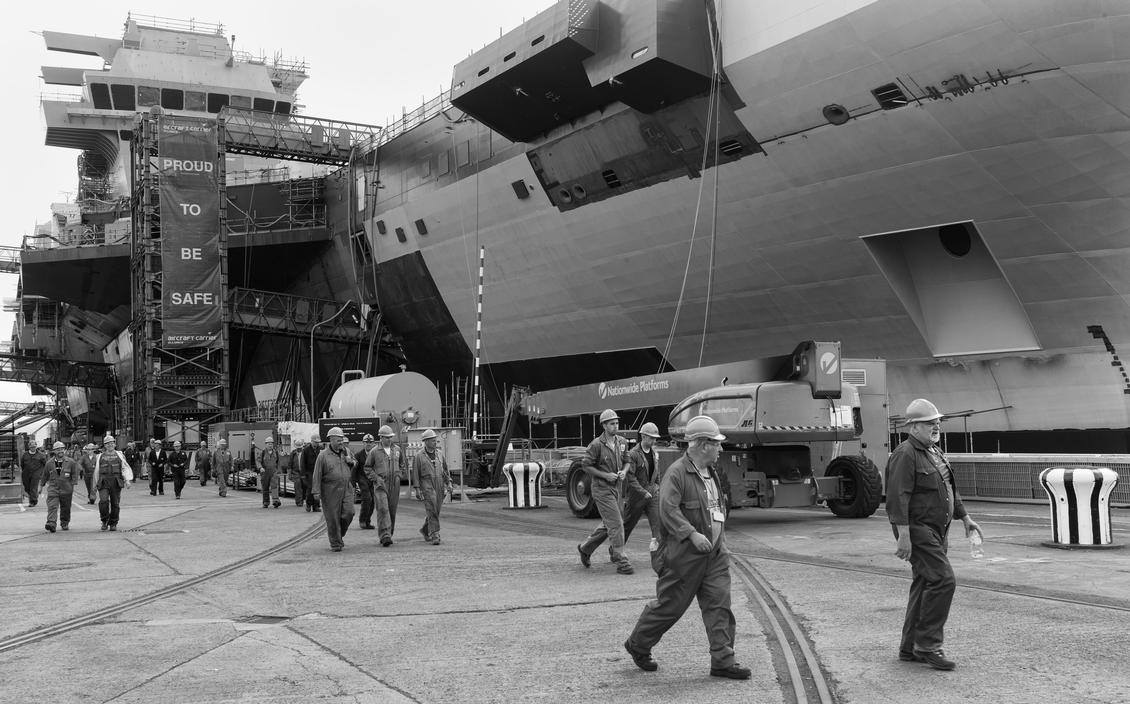
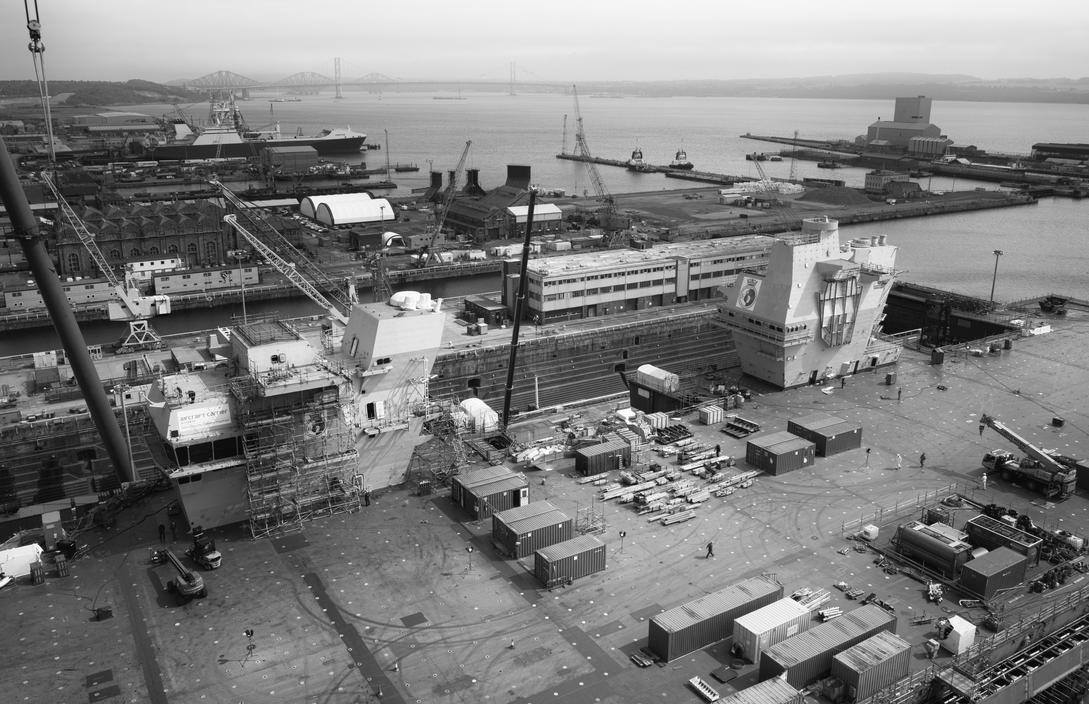
These are by kind courtesy Stuart Franklin/Magnum Photos.
Quite classy images.


These are by kind courtesy Stuart Franklin/Magnum Photos.
Progress diagram for HMS Queen Elizabeth as of this week. Light blue indicates work still outstanding.
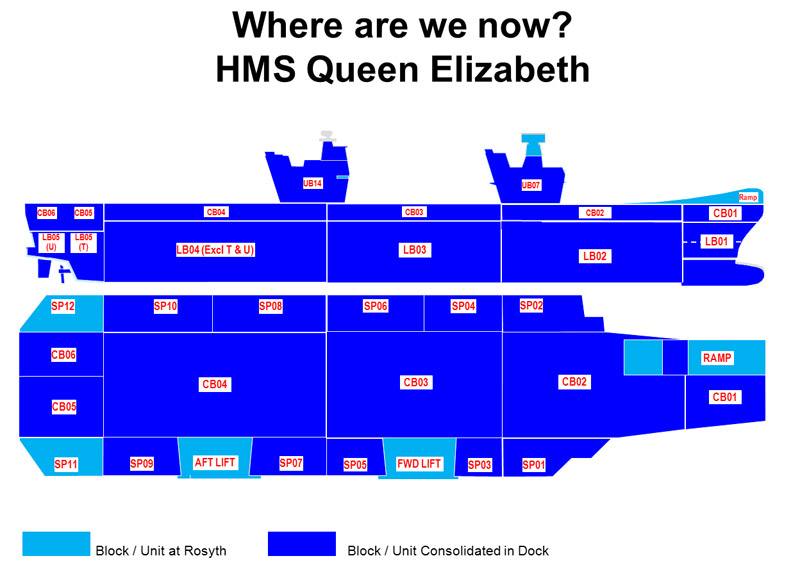

The final sponson of HMS Queen Elizabeth has been installed. The basic deck area is now finished, although the airplane lifts & ski jump are still to
be installed.
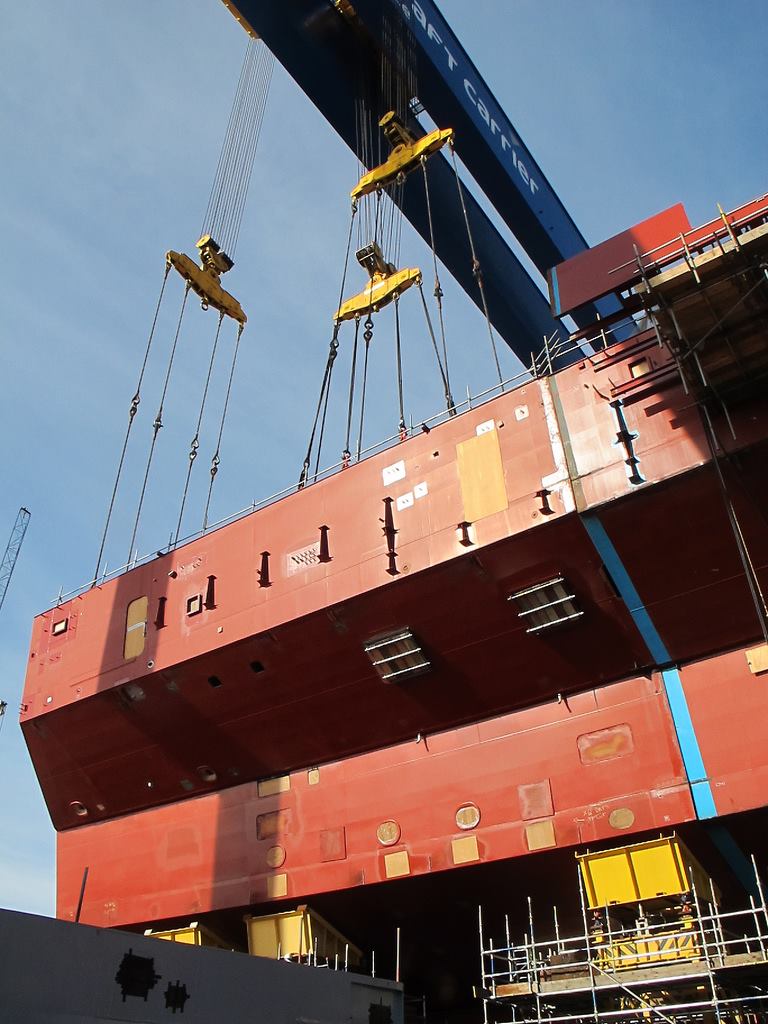
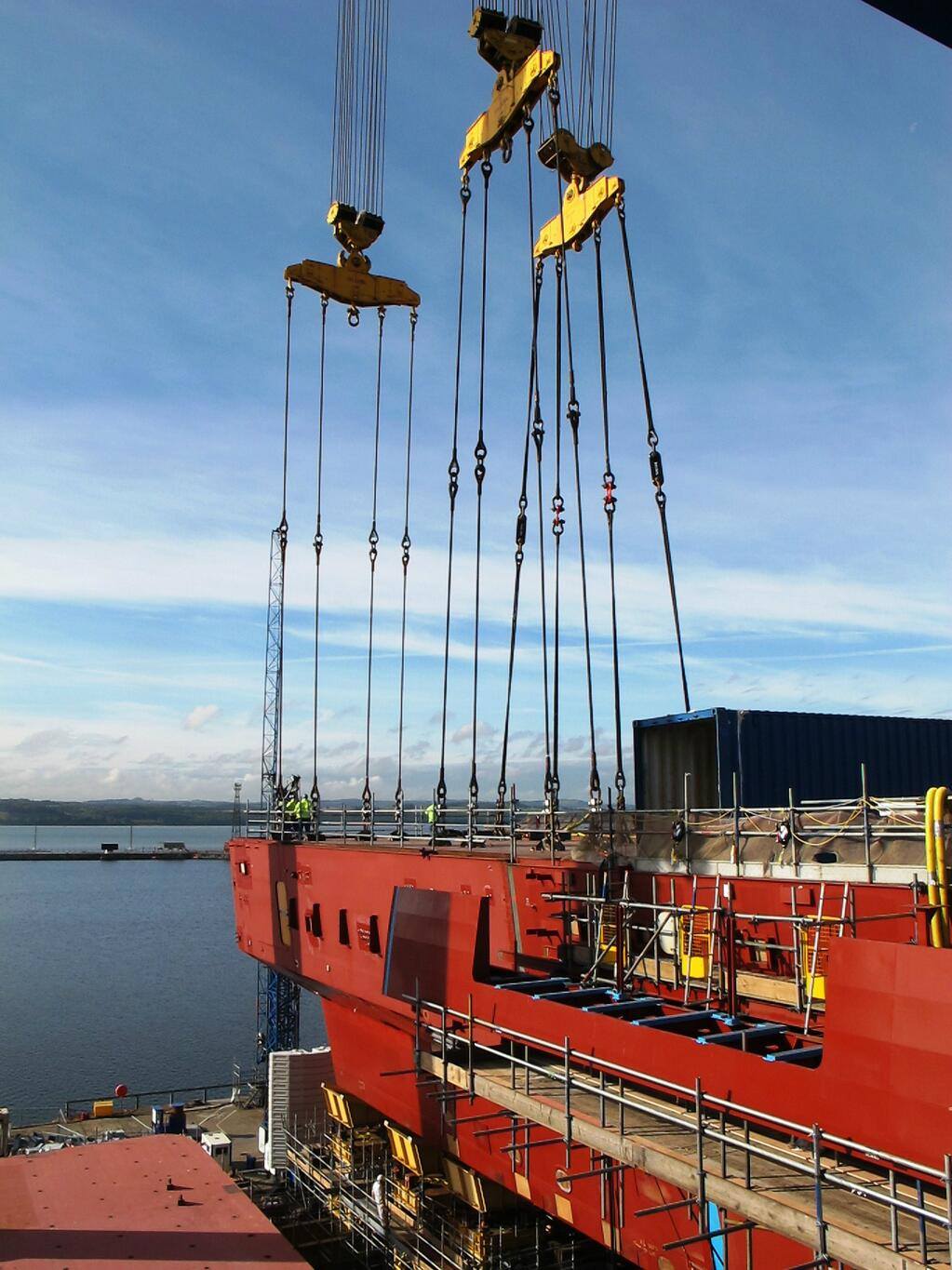
Meanwhile in the Portsmouth yard, HMS Prince of Wales is slowly taking shape. This is part of lower block 2 being assembled. I'd reckon this 2nd ship is maybe a year and a half behind HMS Queen Elizabeth, although I guess that lessons have been learned and assembly of ship 2 might be faster (??)
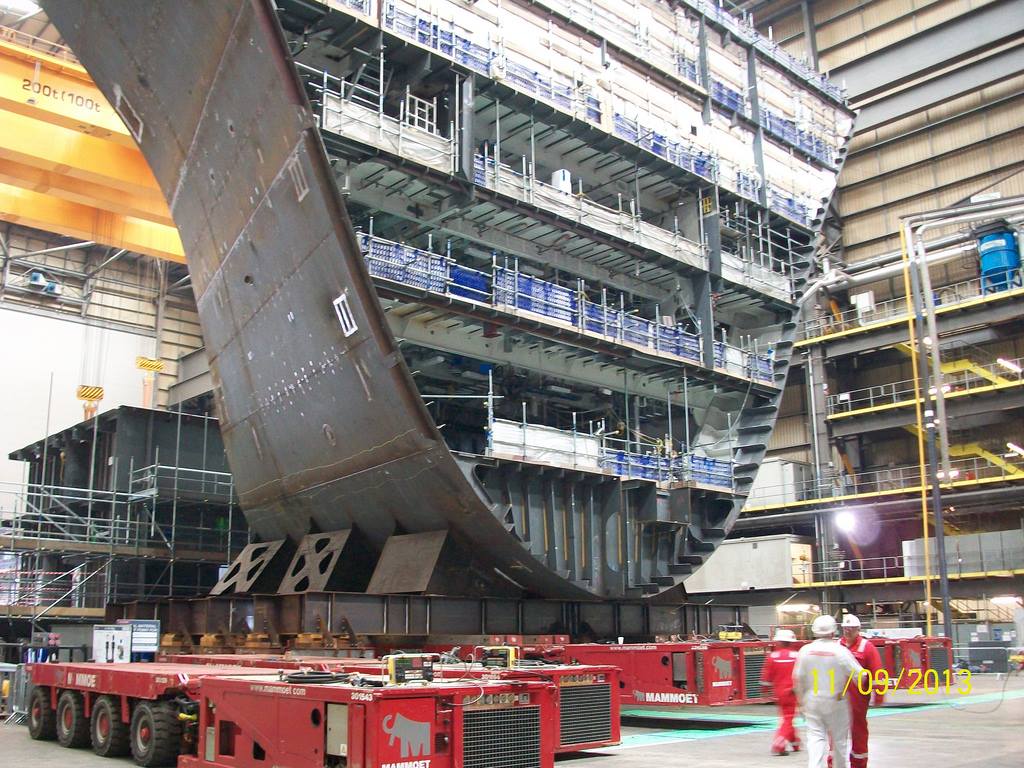


Meanwhile in the Portsmouth yard, HMS Prince of Wales is slowly taking shape. This is part of lower block 2 being assembled. I'd reckon this 2nd ship is maybe a year and a half behind HMS Queen Elizabeth, although I guess that lessons have been learned and assembly of ship 2 might be faster (??)

Picture of HMS Queen Elizabeth from earlier today.
Read this post and claim €10.
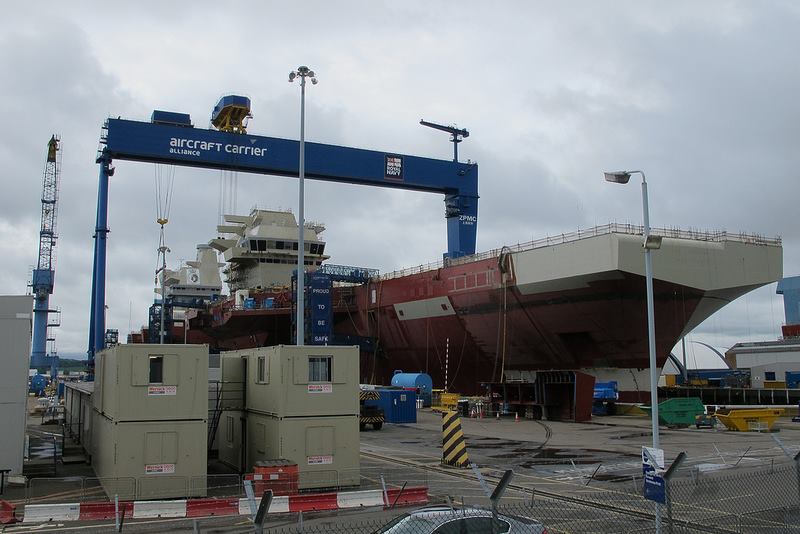
Read this post and claim €10.

reply to post by LeBombDiggity
As a matter of interest, who took the photo's? They are excellent quality.
Having worked on both the Tyne and the Tees for a while back in the day when there was still a remnant of ship building / heavy engineering there I can fully appreciate the craftsmanship and labour that goes into building something of this magnitude.
As a matter of interest, who took the photo's? They are excellent quality.
Having worked on both the Tyne and the Tees for a while back in the day when there was still a remnant of ship building / heavy engineering there I can fully appreciate the craftsmanship and labour that goes into building something of this magnitude.
reply to post by Freeborn
Most of the photos are taken within the yard & attributed to the "Aircraft Carrier Alliance", the consortium of private sector contractors which are designing & building the ships.
The monochrome photos earlier were attributed to a private photographer, most of his photos were absolutely stunning but couldn't be reproduced without permission so I didn't post them here. But I suppose you could go visit the site yourself and go see ... just don't copy them !
The guy's photos are really beautiful.
Magnum Photos / Stuart Franklin Photographer
The ACA website can be found here :-
www.aircraftcarrieralliance.co.uk...
The ACA Flickr website is here :-
www.flickr.com...
and the ACA twitter feed is here :-
twitter.com...
Most of the photos are taken within the yard & attributed to the "Aircraft Carrier Alliance", the consortium of private sector contractors which are designing & building the ships.
The monochrome photos earlier were attributed to a private photographer, most of his photos were absolutely stunning but couldn't be reproduced without permission so I didn't post them here. But I suppose you could go visit the site yourself and go see ... just don't copy them !
The guy's photos are really beautiful.
Magnum Photos / Stuart Franklin Photographer
The ACA website can be found here :-
www.aircraftcarrieralliance.co.uk...
The ACA Flickr website is here :-
www.flickr.com...
and the ACA twitter feed is here :-
twitter.com...
Just a quick post to say thanks. Keep posting these, they are excellent.
Its a thread that doesn't prompt a lot of debate/posts but its quietly appreciated all the same.
Its a thread that doesn't prompt a lot of debate/posts but its quietly appreciated all the same.
reply to post by LeBombDiggity
Thanks for the links.
I've just had a quick look, some remarkable images there - I'll have a good look at my leisure.
Great thread.
Thanks for the links.
I've just had a quick look, some remarkable images there - I'll have a good look at my leisure.
Great thread.
Defense Minister Hammond today said that both ships should be brought into service.
I don't quite know why building two ships & having both serve in your navy is deemed newsworthy ... but hey, welcome to the wonderful world of UK defense procurement.
BFBS News
I don't quite know why building two ships & having both serve in your navy is deemed newsworthy ... but hey, welcome to the wonderful world of UK defense procurement.
Defence Secretary Philip Hammond is going to recommend both Queen Elizabeth class aircraft carriers be brought into service. Existing plans will see HMS Queen Elizabeth enter service on completion, with HMS Prince of Wales kept in mothballs pending the 2015 Strategic Defence and Security Review. Mr Hammond told a Tory party fringe meeting the 70 million pound annual running costs of the second carrier would have to be found from cuts.
He said: "It's got to be a decision for the SDSR... my recommendation would be we should try to support the use of the second carrier. "I think having put the money we have into building the carriers, for the sake of about £70 million per year being able to operate the second carrier looks like a snip. "But it does mean we have to stop doing something else. If we spend an extra £70 million a year to be able to operate two carriers, which gives us a guaranteed one permanently available to go to sea, if we do that we will have to stop doing something else. "All these things are about choices and priorities, what are we going to give up in order to do something that needs to be done.
BFBS News
Here is a night time pic from earlier this week, showing the final sponson (SP11) being added to the flight deck of HMS Queen Elizabeth.
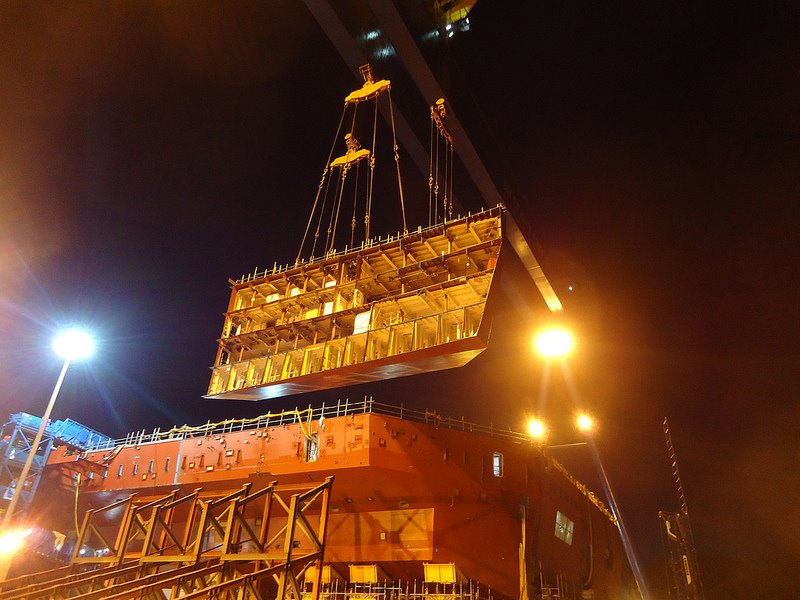
And the ski jump is now slowly taking shape on the flight deck.
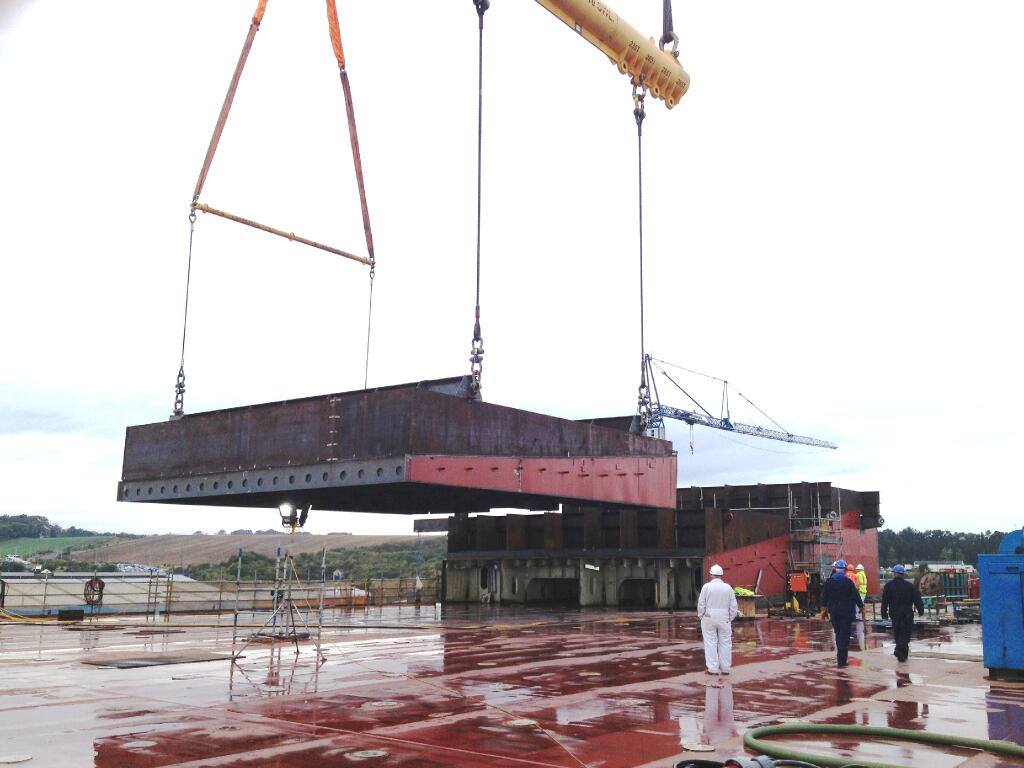
I was thinking earlier, officially these ships aren't going to commission until 2018/2018. At what point though do you think they'll become militarily useful ? For example, say the Argentinians made a play for the Falkland Islands/Malvinas/îles Malouines, could this ship be rushed into commission in an emergency ? Just a theoretical question, I know the lack of Harriers means there's nothing to fly off these ships at the moment anyway (in retrospect, that was a really dumb decision to sell off all those modernized Harriers to the USA for peanuts).

And the ski jump is now slowly taking shape on the flight deck.

I was thinking earlier, officially these ships aren't going to commission until 2018/2018. At what point though do you think they'll become militarily useful ? For example, say the Argentinians made a play for the Falkland Islands/Malvinas/îles Malouines, could this ship be rushed into commission in an emergency ? Just a theoretical question, I know the lack of Harriers means there's nothing to fly off these ships at the moment anyway (in retrospect, that was a really dumb decision to sell off all those modernized Harriers to the USA for peanuts).
reply to post by LeBombDiggity
The carrier becomes potentially useful at the point it which the reformed 617 squadron stands up as operationally capable with F-35B. Any earlier than that is pointless.
No doubt everything could be compressed to some degree if required. Funding profiles in year often have as much to do with procurement timescales than anything else.
Its all moot though. Argentina has no capability to do anything about the Falklands. They are a military shambles. Their big defence procurement this year is buying some ancient Mirage F1s 2nd hand from spain to replace even older Mirage IIIs. The Typhoons would eat them alive.
The sale of the GR9 harriers isn't really relevant to the scenario anyway. They were CAS aircraft not really fighters. The RN Sea Harriers with Blue Vixen and AMRAAM were scrapped back in 2008/2009.
The carrier becomes potentially useful at the point it which the reformed 617 squadron stands up as operationally capable with F-35B. Any earlier than that is pointless.
No doubt everything could be compressed to some degree if required. Funding profiles in year often have as much to do with procurement timescales than anything else.
Its all moot though. Argentina has no capability to do anything about the Falklands. They are a military shambles. Their big defence procurement this year is buying some ancient Mirage F1s 2nd hand from spain to replace even older Mirage IIIs. The Typhoons would eat them alive.
The sale of the GR9 harriers isn't really relevant to the scenario anyway. They were CAS aircraft not really fighters. The RN Sea Harriers with Blue Vixen and AMRAAM were scrapped back in 2008/2009.
reply to post by West Coast
Over and above, the issue of replacing old ships and humanitarian uses, is the fact that the lone "super"-power era is winding down.
As the U.S. military shrinks from the high water Reagan years, less than half the size, from gulf war 1 and gulf war 2, others seem to be expanding in response, if for no other reason than regional influence and protection.
India, for example, has more PAK-50s on order than the U.S. has F-22s. INDIA !!!
Carriers, other than Russia, seems to be the new measuring stick, after 5th gen fighters.
Hmm, an off topic comment, if I may, a U.N. that is on a par with the league of nations, a growing multi-power world, about the same number of nuts running countries, it strikes me a repeat of the world war ingredients of the 20th century.....
Over and above, the issue of replacing old ships and humanitarian uses, is the fact that the lone "super"-power era is winding down.
As the U.S. military shrinks from the high water Reagan years, less than half the size, from gulf war 1 and gulf war 2, others seem to be expanding in response, if for no other reason than regional influence and protection.
India, for example, has more PAK-50s on order than the U.S. has F-22s. INDIA !!!
Carriers, other than Russia, seems to be the new measuring stick, after 5th gen fighters.
Hmm, an off topic comment, if I may, a U.N. that is on a par with the league of nations, a growing multi-power world, about the same number of nuts running countries, it strikes me a repeat of the world war ingredients of the 20th century.....
reply to post by nwtrucker
Russia has plans on adding a Nimitz sized carrier class to her fleet within about 10-15 years. They're in the design phase last I heard.
Russia has plans on adding a Nimitz sized carrier class to her fleet within about 10-15 years. They're in the design phase last I heard.
The tickets in the company for the Christening of the USS Gerald Ford are being offered to company employees right now. I am not interested in going
as I have been on enough of these ships under construction. The Gerald Ford does not interest me at all. She is in drydock 12 at Newport News Shipyard
and soon enough to be flooded and out in the water for continuing outfitting, dock trials ..catapult testing etc etc.
Furthermore..any new ship/boat of a class always has teething problems particularly if they are trying out lots of new technologies and gadgets/systems. Such is the case on the Gerald Ford. It was the same with the Sea Wolf class of submarines.
Same with the F35 fighter as it was with the F22 fighters.
Same years ago with the Bradey fighting vehicles and the M1 Abrahams tank.
It will be the same with the Queen Elizabeth.
Have patience people..have patience.
At the same time we have a congress here in the states causing inflation/depreciation of the money by constant borrowing/printing monies ..then they scream about costs. You have to be educated to be so dumb you dont get it...that you are causing much or most of it. Then they are so dumb they scream about the costs of a carrier or submarine. Think this through carefully about your own government and leaders.
I can remember when some on this forum were speculating that the Qeen Elizabeth carrier would never leave the dry dock because of economics.
I am also in contact through various mediums with people in the UK and they update me on economic and political problems/conditions taking place many of which are kept from us here stateside by our own leadership and the media shilling for them. Problems on the continent as well. I speak here particularly of economic problems..because the military can only arm and do well in this arena if the civilian economy does well.
BeWarned.
You folks in the UK are long overdue for a replacement carrier. I am glad for your country. Hope this ship does well on her trials and makes haste to operational status. Lots still to do on her to get her out to sea and operational squadrons aboard.
Nice photos...particularly the motor propulsion unit being lowered to the foundation. That one I examined closely. Thanks for the photos.
Orangetom
Furthermore..any new ship/boat of a class always has teething problems particularly if they are trying out lots of new technologies and gadgets/systems. Such is the case on the Gerald Ford. It was the same with the Sea Wolf class of submarines.
Same with the F35 fighter as it was with the F22 fighters.
Same years ago with the Bradey fighting vehicles and the M1 Abrahams tank.
It will be the same with the Queen Elizabeth.
Have patience people..have patience.
At the same time we have a congress here in the states causing inflation/depreciation of the money by constant borrowing/printing monies ..then they scream about costs. You have to be educated to be so dumb you dont get it...that you are causing much or most of it. Then they are so dumb they scream about the costs of a carrier or submarine. Think this through carefully about your own government and leaders.
I can remember when some on this forum were speculating that the Qeen Elizabeth carrier would never leave the dry dock because of economics.
I am also in contact through various mediums with people in the UK and they update me on economic and political problems/conditions taking place many of which are kept from us here stateside by our own leadership and the media shilling for them. Problems on the continent as well. I speak here particularly of economic problems..because the military can only arm and do well in this arena if the civilian economy does well.
BeWarned.
You folks in the UK are long overdue for a replacement carrier. I am glad for your country. Hope this ship does well on her trials and makes haste to operational status. Lots still to do on her to get her out to sea and operational squadrons aboard.
Nice photos...particularly the motor propulsion unit being lowered to the foundation. That one I examined closely. Thanks for the photos.
Orangetom
No shiny pictures for this post, unfortunately.
I subscribe to a UK magazine called Private Eye, i read that and a few others because it helps me with my English. Private Eye is a satirical magazine but it's also one of the few really investigative news sources in UK. Tucked away on Page 33 of the current issue is an article about the F-35's that the UK is purchasing.
The Public Accounts Committee of the UK lower house of Parliament is already very pissed off about the procurement decisions for the Queen Elizabeth class carriers, the ships are basically £2 billion over budget and are to be delivered three years late. The back and forward and back again decisions not to use the F-35C and catapults and traps has cost the Defense Ministry a small fortune. The committee in particular has censored civil servants for their utter incompetence in matters financial, for even basic errors about not factoring government sales taxes, interest rates into their calculations.
Anyway, it's now the F-35B which is getting their attention, in particular the training regime for new British pilots of this airplane. There's seemingly 15 countries now signed up to purchase this airplane, 14 of which will use the training facilities of the US Air Force at Eglin Air Force Base. One country is going it alone ... guess which ... the United Kingdom.
Long story short. It'd cost £1.4 million to train each one of the 120 UK F-35B pilots in the USA and it'd mean 3 UK F-35B's would be devoted entirely to training purposes for the duration.
But by doing it themselves at RAF Marham, it'll cost £4.5 million to train each one of these pilots. And 10 British F-35B's will have to be used for training, not three. That's just about a whole squadron.
Admiral West, the First Sea Lord, has been scathing in his criticisms, basically accusing the Defense Ministry of being parochial in it's decision to create an F-35B training school of it's own, that it should better have used that money to keep HMS Ark Royal in commission and Harriers on both it and HMS Illustrious, maintaining a small two carrier force for the UK until the new Queen Elizabeth class ships were in commission.
Margaret Hodge MP, chairman of the parliamentary committee, said that "The committee is still not convinced that the MoD has this programme [F-35B programme] under control. It remains subject to huge technical and commercial risks, with the potential for further uncontrolled growth in costs".
I've seen Mrs Hodge in action in Parliament. You really don't want to get on her bad side.
Daily Telegraph - Basic accounting errors on carrier jets cost taxpayer £74m
Aviation Week - Parliamentary Report Says U.K. JSF Buy Remains 'High Risk'
I subscribe to a UK magazine called Private Eye, i read that and a few others because it helps me with my English. Private Eye is a satirical magazine but it's also one of the few really investigative news sources in UK. Tucked away on Page 33 of the current issue is an article about the F-35's that the UK is purchasing.
The Public Accounts Committee of the UK lower house of Parliament is already very pissed off about the procurement decisions for the Queen Elizabeth class carriers, the ships are basically £2 billion over budget and are to be delivered three years late. The back and forward and back again decisions not to use the F-35C and catapults and traps has cost the Defense Ministry a small fortune. The committee in particular has censored civil servants for their utter incompetence in matters financial, for even basic errors about not factoring government sales taxes, interest rates into their calculations.
Anyway, it's now the F-35B which is getting their attention, in particular the training regime for new British pilots of this airplane. There's seemingly 15 countries now signed up to purchase this airplane, 14 of which will use the training facilities of the US Air Force at Eglin Air Force Base. One country is going it alone ... guess which ... the United Kingdom.
Long story short. It'd cost £1.4 million to train each one of the 120 UK F-35B pilots in the USA and it'd mean 3 UK F-35B's would be devoted entirely to training purposes for the duration.
But by doing it themselves at RAF Marham, it'll cost £4.5 million to train each one of these pilots. And 10 British F-35B's will have to be used for training, not three. That's just about a whole squadron.
Admiral West, the First Sea Lord, has been scathing in his criticisms, basically accusing the Defense Ministry of being parochial in it's decision to create an F-35B training school of it's own, that it should better have used that money to keep HMS Ark Royal in commission and Harriers on both it and HMS Illustrious, maintaining a small two carrier force for the UK until the new Queen Elizabeth class ships were in commission.
Margaret Hodge MP, chairman of the parliamentary committee, said that "The committee is still not convinced that the MoD has this programme [F-35B programme] under control. It remains subject to huge technical and commercial risks, with the potential for further uncontrolled growth in costs".
I've seen Mrs Hodge in action in Parliament. You really don't want to get on her bad side.
Daily Telegraph - Basic accounting errors on carrier jets cost taxpayer £74m
Aviation Week - Parliamentary Report Says U.K. JSF Buy Remains 'High Risk'
reply to post by LeBombDiggity
The last I heard the RAF/RN pilots would train with the Marines in South Carolina at their facility there. Did that change recently?
The last I heard the RAF/RN pilots would train with the Marines in South Carolina at their facility there. Did that change recently?
Here's the article Zaphod, I couldn't find it online so photo'd it for you lol. You might have to visit my profile and online picture gallery
though to magnify it.


new topics
-
Paramilitary Leaks - John Williams
Whistle Blowers and Leaked Documents: 6 hours ago -
Some sausage, some chicken, some sauce, some onions and some garlic...and some peppers!
Food and Cooking: 8 hours ago -
Hearing more ambulances lately
Medical Issues & Conspiracies: 8 hours ago -
Los Angeles brush fires latest: 2 blazes threaten structures, prompt evacuations
Mainstream News: 8 hours ago -
House Passes Laken Riley Act
Mainstream News: 9 hours ago -
The more I think about it
General Chit Chat: 9 hours ago -
What Comes After January 20th
Mainstream News: 11 hours ago -
Canada as a state .. how would it work?
General Chit Chat: 11 hours ago
top topics
-
House Passes Laken Riley Act
Mainstream News: 9 hours ago, 23 flags -
What Comes After January 20th
Mainstream News: 11 hours ago, 18 flags -
Planned Civil War In Britain May Be Triggered Soon
Social Issues and Civil Unrest: 16 hours ago, 7 flags -
Los Angeles brush fires latest: 2 blazes threaten structures, prompt evacuations
Mainstream News: 8 hours ago, 7 flags -
Let's Buy Greenland
General Chit Chat: 13 hours ago, 6 flags -
Hearing more ambulances lately
Medical Issues & Conspiracies: 8 hours ago, 6 flags -
Those stupid GRAVITE commercials
Rant: 12 hours ago, 5 flags -
The more I think about it
General Chit Chat: 9 hours ago, 4 flags -
Canada as a state .. how would it work?
General Chit Chat: 11 hours ago, 4 flags -
Paramilitary Leaks - John Williams
Whistle Blowers and Leaked Documents: 6 hours ago, 4 flags
active topics
-
Los Angeles brush fires latest: 2 blazes threaten structures, prompt evacuations
Mainstream News • 13 • : BeyondKnowledge3 -
-@TH3WH17ERABB17- -Q- ---TIME TO SHOW THE WORLD--- -Part- --44--
Dissecting Disinformation • 3966 • : RelSciHistItSufi -
House Passes Laken Riley Act
Mainstream News • 16 • : KrustyKrab -
Planned Civil War In Britain May Be Triggered Soon
Social Issues and Civil Unrest • 16 • : Freeborn -
Judge rules president-elect Donald Trump must be sentenced in 'hush money' trial
US Political Madness • 60 • : WeMustCare -
Inca stone masonry at Sacsayhuaman, Ollantaytambo and the Sun Temple
Ancient & Lost Civilizations • 23 • : Hansllune -
Paradox of Progress
Ancient & Lost Civilizations • 14 • : Hansllune -
Let's talk planes.
General Chit Chat • 10 • : Dalamax -
Paramilitary Leaks - John Williams
Whistle Blowers and Leaked Documents • 8 • : caterpillage -
Claim: General Mark Milley Approved Heat and Sound Directed Energy Weapons During 2020 Riots
Whistle Blowers and Leaked Documents • 25 • : NoCorruptionAllowed
